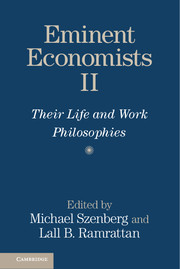Book contents
- Frontmatter
- Dedication
- Contents
- List of Contributors
- Foreword
- Preface and Acknowledgments
- Introduction
- 1 Being There: An Intellectual Journey
- 2 Social Norms in Economics and in the Economics Profession
- 3 Personal Reflections on My Professional Life
- 4 Gray Eminence?
- 5 Biochemist to Economist
- 6 Puzzles and Paradoxes: A Life in Applied Economics
- 7 Succeeding in Economics
- 8 My Research Strategy
- 9 My Philosophy of Economics, Life, and Everything (Not!)
- 10 Finding a Niche
- 11 Become an Economist – See the World
- 12 Practitioner of the Dismal Science? Who, Me? Couldn’t Be!!
- 13 One Job, Four Careers
- 14 My Life and Research Strategy
- 15 How I Ended Up Being a Multifaceted Economist and the Mentors I Have Had
- 16 Searching for My Personal Philosophy
- 17 Learning about the Evolving International Economy
- 18 Confessions of a Wellesley FEM
- 19 God, Ants, and Thomas Bayes
- 20 The Path of a Monetary Economist
- 21 Learning from the Field
- 22 Order in and through Disorder: The Invisible Hand as a Turbulent Regulator
- 23 The Education of an Economist
- 24 Faith, Science, and Religion
- 25 My Studies in International Economics
- 26 Sailing into the Wind
- 27 My Life and Work Philosophy
- 28 Scaling Fortress Economics
- 29 The Accidental Economist
- Index
15 - How I Ended Up Being a Multifaceted Economist and the Mentors I Have Had
Published online by Cambridge University Press: 05 June 2014
- Frontmatter
- Dedication
- Contents
- List of Contributors
- Foreword
- Preface and Acknowledgments
- Introduction
- 1 Being There: An Intellectual Journey
- 2 Social Norms in Economics and in the Economics Profession
- 3 Personal Reflections on My Professional Life
- 4 Gray Eminence?
- 5 Biochemist to Economist
- 6 Puzzles and Paradoxes: A Life in Applied Economics
- 7 Succeeding in Economics
- 8 My Research Strategy
- 9 My Philosophy of Economics, Life, and Everything (Not!)
- 10 Finding a Niche
- 11 Become an Economist – See the World
- 12 Practitioner of the Dismal Science? Who, Me? Couldn’t Be!!
- 13 One Job, Four Careers
- 14 My Life and Research Strategy
- 15 How I Ended Up Being a Multifaceted Economist and the Mentors I Have Had
- 16 Searching for My Personal Philosophy
- 17 Learning about the Evolving International Economy
- 18 Confessions of a Wellesley FEM
- 19 God, Ants, and Thomas Bayes
- 20 The Path of a Monetary Economist
- 21 Learning from the Field
- 22 Order in and through Disorder: The Invisible Hand as a Turbulent Regulator
- 23 The Education of an Economist
- 24 Faith, Science, and Religion
- 25 My Studies in International Economics
- 26 Sailing into the Wind
- 27 My Life and Work Philosophy
- 28 Scaling Fortress Economics
- 29 The Accidental Economist
- Index
Summary
As is clear from my title, professor of economics, political science, and public policy at UCLA, I ended up being a multifaceted economist, working not only in economics per se but also in international relations as part of my involvement in political science and public policy issues. Even within economics itself, while most economists work in one or two fields, I work in many, including:
Economic theory and mathematical economics
Econometrics
Health economics
Reform of the Russian economy
Strategy and arms control
In this essay I would like to explain how this happened, starting from the beginning when I was an undergraduate student at MIT, majoring in mathematics. As I started the junior- and senior-level courses in mathematics, I felt that the material was too abstract, and I was looking for something that was tangible and more connected to the real world. I took a course on twentieth-century economists taught by Elspeth Huxley Rostow, and it was this course that convinced me to become an economist. The course included a few lectures by Elspeth’s husband, Walt W. Rostow, at that time professor of economics at MIT and later to become national security adviser to President Lyndon B. Johnson during the Vietnam War. (They both ended up at the LBJ School of the University of Texas, Austin, and I saw them there many years later when visiting James Galbraith while Elspeth was the dean of the school.)
- Type
- Chapter
- Information
- Eminent Economists IITheir Life and Work Philosophies, pp. 213 - 218Publisher: Cambridge University PressPrint publication year: 2014



